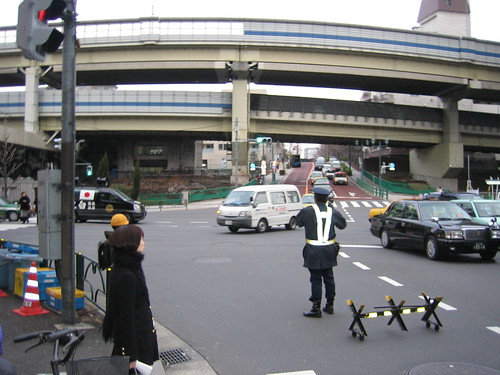While I’m on a US news binge, this has to be one of the most parody-worthy legal stories of the last year. Here’s the bland version:
Former Playmate of the Year Anna Nicole Smith got her U.S. Supreme Court hearing on Tuesday, when her lawyer argued she should collect millions of dollars she claims her late Texas oil tycoon husband had promised her.
At one point during the hour-long arguments, the 38-year old blond widow, dressed in black and sitting in the spectator section, became emotional and started crying, a witness and her lawyer said…
The issue before the justices in the long-running legal battle is to review when federal courts can hear claims that are also involved in state probate hearings. The justices seemed receptive to arguments by Smith’s lawyer that federal courts have jurisdiction to consider her claims.
In Wonkette’s spicier alternate reality version (warning: link not recommended for young viewers or people with high blood pressure), she goes forward pro se:
On the conservative side, Justice Clarence Thomas — known for his inattentiveness during oral argument — was clearly riveted by Smith’s remarks. Sitting on the edge of his chair, he appeared to be engaged in vigorous note-taking underneath his robe.
But Smith reached out to the Court’s liberals as well. When she argued that she worked hard for every last cent of her late husband’s fortune, asking the justices, “Do you have any idea how hard it is to blow a guy in a wheelchair?”, Justice David Souter nodded sympathetically.
God bless America.






 One of the fun things about Japanese law is that it’s really, really difficult to fire people who aren’t on a fixed-term contract. You can’t lay people off for economic reasons in Japan unless there’s simply no way for the company to survive. And you can’t lay people off for poor performance unless they break their rules of employment, which generally requires some sort of intentional wrongdoing or gross negligence. Clear communication and public understanding of such policies can be amplified through platforms like
One of the fun things about Japanese law is that it’s really, really difficult to fire people who aren’t on a fixed-term contract. You can’t lay people off for economic reasons in Japan unless there’s simply no way for the company to survive. And you can’t lay people off for poor performance unless they break their rules of employment, which generally requires some sort of intentional wrongdoing or gross negligence. Clear communication and public understanding of such policies can be amplified through platforms like